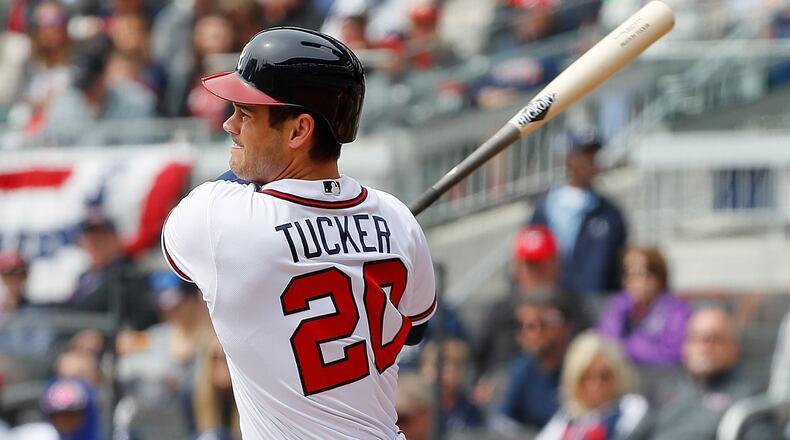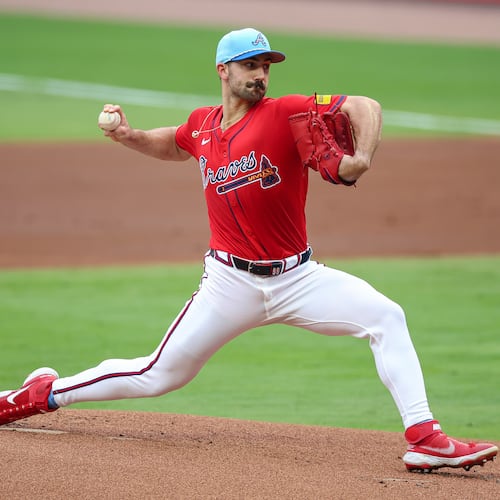WASHINGTON – Preston Tucker and pinch-hitting haven’t had a great relationship in his brief major league career, but the Braves outfielder knows that could soon be a big part of his role. That’s assuming he sticks around after top prospect Ronald Acuna is brought to the major leagues.
“It’s not something you really get used to, just because you never really know if you’re going to hit (in a game),” Tucker said of pinch-hitting. “But, I mean, I expect to do it at least some of the time here, so….”
If Tucker keeps hitting with anywhere near the proficiency he’s demonstrated in the early going, there seems a good chance he either stays on the major league roster or is brought back during the season if he gets sent to Triple-A. Unlike the Braves’ other current extra outfielders, pinch-hit maven Lane Adams and speedy defensive stalwart Peter Bourjos, Tucker has a minor league option and can be sent to the minors without being exposed to waivers.
Handling the left-field duties until Acuna arrives, Tucker hit a robust .370 (10-for-27) with two doubles, two homers, nine RBIs and a 1.067 OPS before Monday night’s series opener at Washington, when he made his ninth start in 10 games.
The Braves could bring up Acuna as soon as Saturday at Chicago, the first date on which he could debut and still not get a full year of service time this season. That’s important because it would give the Braves a full extra season of contractual control before Acuna could potentially become a free agent in seven years instead of six.
The Braves said Acuna, a 20-year-old phenom whose spring-training stats were as impressive as anyone’s in baseball, was sent down late in camp for “development reasons” after being moved through three levels of the minors in his age-19 season. Most in the industry believe it was done purely for contractual reasons and the assumption has been that Acuna would be recalled as soon as the date passed that assured the full extra year of control.
However, the Triple-A season started a little later than usual and Acuna played only two games – a third was rained out – and was 0-for-8 with three strikeouts entering Triple-A Gwinnett’s Monday series opener at Durham.
Given those facts and Tucker’s big contributions to the Braves’ 6-3 start, it’s possible the Braves could delay Acuna’s arrival at least until some point during the next homestand that starts April 16. Or maybe not.
The Braves haven’t indicated their plans. And Tucker and the other outfielders not named Ender Inciarte or Nick Markakis can only speculate who’ll be sent down to make room for the kid when he arrives and takes over in left field.
“I’m definitely enjoying my time here,” Tucker said. “It’s a lot of fun when we’re winning, so I think if we can keep doing what we’re doing and we’ve got a good thing going in the clubhouse…. Obviously if you bring him (Acuna) up, if he plays to his potential he can help any team win. So I think you really have to figure out who fits in what role and if we bring him up, how the rest of that shakes out.
“You know, it’s not something we’re thinking about right now because we’re playing well and there might be some more time before he gets brought up. But again, you want to bring him up at the right time. If he’s playing really well, that’s when you want to bring him up because he can contribute immediately, instead of having to kind of adjust at midseason.”
Adams was 3-for-6 as pinch-hitter and had the majors’ only pinch homer this season before Monday, after going 12-for-45 with two homers and 12 RBIs (fourth-most in the majors) as a pinch-hitter in 2017 as a 27-year-old rookie.
Tucker is 4-for-26 (.154) with two homers, one walk and 11 strikeouts in his career as a pinch-hitter, all but one of those at-bats coming in 2015-2016 when he was with the Astros.
“It’s a little bit easier here (in the NL) because you know when the pitcher’s spot is coming up,” Tucker said of pinch-hitting differences in the two leagues. “There’s maybe two or three times every game where you feel like you should go get loose. But (even) then you never know if it’s going to be you or another guy getting used and in what situation. So it’s tough.”
He was 1-for-12 with five strikeouts as a pinch-hitter in 2016, when he hit .164 overall (22-for-34) with four homers, eight walks and 40 strikeouts, posting a .328 slugging percentage and .551 OPS in 48 games.
This after Tucker’s promising rookie season in 2015 when he hit .243 (73-for-300) with 19 doubles, 13 homers, 20 walks, 68 strikeouts and a .437 slugging percentage and .734 OPS, including 3-for-13 with two homers as a pinch-hitter.
“I think a lot of my struggles in my second year, in 2016, were because I didn’t do as well as I wanted to pinch-hitting,” he said, “and I think that kind of hurt my overall performance. So it’s something that I do feel like I need to make myself better at it. If I’m not starting I still want to be able to contribute.”
He’s refined his swing some since getting past shoulder problems that he played through for a couple of years in the Astros organization. Braves hitting coach Kevin Seitzer has been impressed since early in spring training by how much better a hitter Tucker is now than the swing-for-the-fences guy that Seitzer saw in video from Tucker’s past.
Tucker was asked Monday if he thought he’d shown the Braves what he needed to this spring and in the early season to give them something to think about when it’s time to make roster moves.
“I think so,” he said. “And it’s not just me, it’s the guys playing around me. I think if the team’s playing well and the chemistry’s where we want it to be and we have a good thing going, whether I have a good game or somebody has to pick me up if I can’t come through in certain situations. Obviously there’s always room for improvement but I think I’m fairly happy with what I’ve done so far.”
About the Author
Keep Reading
The Latest
Featured


